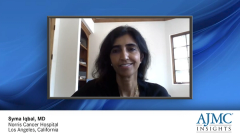
KEYNOTE-590 Trial Impacting Treatment Landscape for ESCC and Upper GI Cancer
Syma Iqbal, MD, provides an overview of the KEYNOTE-590 trial and its impact on treatment pathways for ESCC and GI cancers.
Episodes in this series

Syma Iqbal, MD: KEYNOTE-590 was a randomized phase 3 trial for patients with untreated esophageal cancer, both adenocarcinoma and squamous cell carcinoma. This was a global study. Patients were randomized to chemotherapy vs chemotherapy plus pembrolizumab. The coprimary end points of the study were overall survival and progression-free survival in all comers and patients who had a PD-L1 CPS [combined positive score] of 10 or greater. The majority of patients who participated in the trial had squamous cell carcinoma. That was approximately 70% of the population. About 50% of the patients were accrued from Asia.
This trial demonstrated that patients who received chemotherapy, 5-FU [5-fluorouracil] and platinum-based treatment plus pembrolizumab, had a superior outcome in terms of overall survival compared with chemotherapy alone. This was demonstrated in all comers and patients with a PD-L1 CPS of 10 or greater. Furthermore, this was demonstrated significantly in patients who had esophageal squamous cell carcinoma. Based on this study, the FDA approved the addition of pembrolizumab to chemotherapy for patients with adenocarcinoma and squamous cell carcinoma in combination with 5-FU–platinum–based treatment. As such, it has been incorporated into care for this population.
This study demonstrated an improvement in overall survival from 8 to 9 months to about 13 months. There was statistically significant improvement in outcome in the CPS 10 and greater population as well as all comers.
Transcript edited for clarity.
Newsletter
Stay ahead of policy, cost, and value—subscribe to AJMC for expert insights at the intersection of clinical care and health economics.











